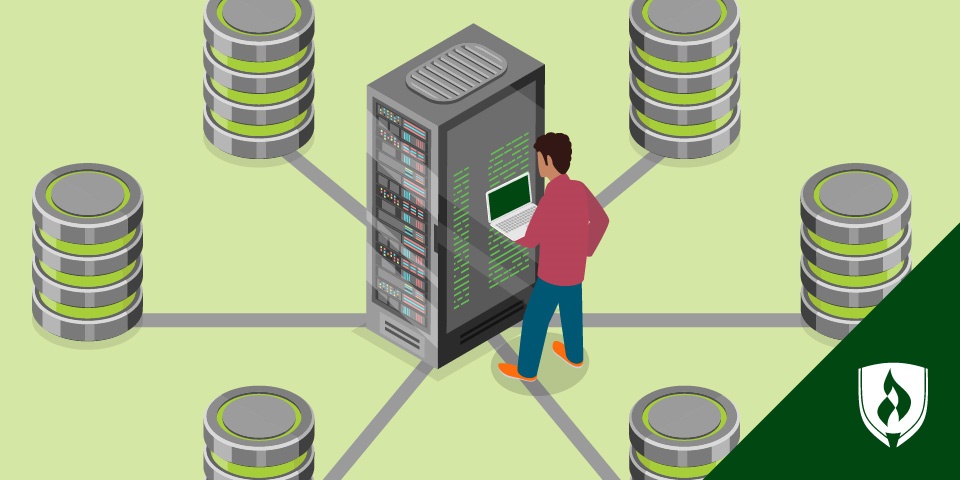
There was a time when as many as one-in-four Americans had jobs in manufacturing. During the Industrial Age, iron and coal dominated the U.S. workforce. Today, however, it seems you’re almost as likely to find more people mining cryptocurrencies than mining coal.
So where have all the jobs gone? When the Information Age swept in during the late 20th century, our economy was met with swift change, transitioning from a dependence on traditional industry to a reliance on computers and digital information. As the demand for automation and enhanced technology continues to rise, paths have been paved for an influx of technology jobs for which we need skilled digital natives—computer enthusiasts like you.
If you’re the type who’s become the go-to guy or gal any time a family member or friend has a complicated technology question, who practically dreams in JavaScript® or Python® and who wears the label “Tech Geek” with pride, then we’ve got some great news for you: There are computer jobs for people like you everywhere.
Growth of computer and technology careers is becoming more and more industry-agnostic. That’s because in today’s digital economy, technology has become a staple in every field. From high tech and business to healthcare and even manufacturing, there are plenty of computer-related jobs to choose from. Keep reading to get a taste of the types of computer jobs out there. Also check out signs you should be working in tech.
17 Computer careers for technology junkies
It’s safe to say that now is a great time to pursue a career in technology. In fact, the Bureau of Labor Statistics (BLS) projects employment of professionals in computer and information technology careers to increase much faster than average, with 12 percent growth projected through 2028.1 Let us introduce you to some of the many computer jobs worth considering.
1. Big data engineer
Big data engineers spend their work days communicating with business users and data scientists with the goal of translating business objectives into workable data-processing workflows. These positions require a robust knowledge of statistics, experience with programming and the ability to design and implement working solutions for common big data challenges.
2. Applications architect
Digital pros who land a position like applications architect are required to maintain a high level of technical expertise while also excelling in areas like planning, coordination, communication and teamwork. These professionals are tasked with designing major aspects of the architecture of an application, providing technical leadership to the development team, performing design and code reviews, ensuring enterprise-wide application standards are met and more.
3. Web developer
A web developer is the person responsible for the building and maintenance of a website. Because a website is often an organization’s primary public-facing property, it’s important for web developers to understand business needs and how to build sites that accommodate them. This position requires an in-depth knowledge of internet protocols and development languages like PHP, JavaScript, HTML5 and CSS as well.
4. Database administrator
Put simply, database administrators use specialized software to securely store and organize data, ensuring that data is both available to users and secure from unauthorized access. Additional duties include identifying user needs to create and administer databases, testing and making modifications to database structure as needed and merging old databases into new ones. Because many databases contain personal and financial information, database administrators make security a top priority.
5. Computer hardware engineer
Computer hardware engineers are tasked with designing, developing and supervising the production of computer hardware like keyboards, modems, printers, computer systems, chips and circuit boards. Their duties are similar to those of electronics engineers, although they focus exclusively on computer technology, with tasks like designing blueprints of new equipment, making models of new hardware designs, upgrading current computer equipment and supervising the manufacturing of new hardware.
6. Computer software engineer
Conversely, computer software engineers focus their work on designing and developing software used to control computers by utilizing the principles of computer science and mathematical analysis. You’ll typically see this work materialize through the design and development of computer games, word processors, operating systems and compilers.
7. Data security analyst
Data security analysts use their thorough understanding of computer and network security, including aspects like firewall administration, encryption technologies and network protocols, to perform security audits and risk assessments on behalf of their organizations, make recommendations for enhancing system security, research attempted breaches of data security, rectify security weaknesses and formulate security policies and procedures. They’re also expected to stay up-to-date with industry security trends and relevant government regulations.
8. Information systems security manager
Quality information systems security managers provide leadership, guidance and training to information systems security personnel. This requires a strong technical background in tandem with excellent interpersonal and management skills. Typical duties include reviewing, implementing, updating and documenting information security policies and procedures within an organization, in addition to ensuring that legal and contractual security and privacy mandates are adhered to.
9. Health information technology careers
While jobs in technology continue to rise in prevalence, so too do jobs in the healthcare field. Health information technology (HIT) is an excellent way to blend the two, launching your career in the midst of rapid growth. The HIT field is a specialized subset of information technology professionals who work for medical facilities and other healthcare organizations to increase the efficiency and quality of clinical care through technology. You can expect to encounter tech positions in healthcare environments that center on elements like electronic billing and coding systems, electronic medical records and networks for digital imaging.
10. Statistician
Quality statisticians are needed in a litany of different industries, including economics, government, business, biology, engineering, politics, public health, medicine, psychology, marketing, education and even sports. They collect, analyze and present data using their knowledge of statistics to conduct surveys, opinion polls and more. Statisticians use their technical skills to determine how to best collect information, what groups to test, what questions to ask and how to interpret and publish their findings.
11. Mathematician
Mathematicians use mathematical theory, algorithms and computational methods to answer questions relating to everything from economics, business and engineering to physics and other sciences. They are often tasked with both utilizing existing mathematical theories and developing new ones to connect previously unknown relationships between mathematical concepts. Our digital landscape’s influx of technical capabilities has catapulted mathematicians’ abilities to develop data-driven solutions for real-world problems.
12. Business intelligence analyst
Business intelligence analysts are responsible for designing and developing data analysis and reporting solutions, communicating analysis results while making recommendations to senior management teams and developing data cleansing regulations for their organizations. In order to land this computer career, you’ll need to have a strong background in database technology, analytical reporting and languages like SQL and Python, while also demonstrating excellent written and oral communication skills.
13. Computer and information research scientist
These highly skilled professionals spend their work days inventing and designing new approaches to computing technology while also discovering innovative uses for technologies that already exist. Computer and information research scientists can work in business, science, medicine and other fields to study and solve complex problems, creating and improving computer software and hardware.
14. Network architect
Network architects use their backgrounds in networking technology to assess business and application requirements for phone, data and internet systems for an organization. This includes planning, designing and upgrading network installation projects, troubleshooting network architecture, making recommendations for system enhancements and maintaining backup, version-control and defense systems. Network architects help business leaders make informed decisions on network investments that fit their short and long-term needs.
15. Systems engineer
This experienced tech position requires the ability to communicate complex information to technical and nontechnical users, relying on an in-depth knowledge of the technology in use, as well as advanced analytical, troubleshooting and design skills. Systems engineers are charged with developing, maintaining and supporting technical infrastructure, hardware and system software components, while also providing user support across multiple infrastructure platforms.
16. Computer support specialist
The important work of computer support specialists is pretty accurately explained by the title itself. They provide help and advice to computer users and organizations by offering technical assistance directly to computer users. This includes regular testing, troubleshooting and overall maintenance of existing network systems.
17. Mobile application developer
Mobile application developers specialize in coding, testing, debugging and monitoring mobile apps. They use their strong analytical and programming skills to contribute to the development of ongoing projects, recommending changes and enhancements to software applications as needed. Most mobile application developer positions will require previous experience building mobile applications across a number of different platforms, in addition to knowledge of common mobile development languages.
Which computer career path will you choose?
It’s clear that today’s self-proclaimed tech geeks have the unique opportunity to steer their careers in just about any direction they choose. Can you envision your future in one of the computer jobs listed above?
If you’re considering working in this industry, you’ve likely thought about pursuing some formal education in either Computer Science or Information Technology. But how do you know which of these options makes sense for you? We laid out a side-by-side comparison for you in our article, “Computer Science vs. Information Technology: Decoding the Differences.”
Related Articles:
- 22 Can't-Miss Tech Podcasts You Should Be Following
- Web Developer vs. Software Developer: Which Coding Context Fits You?
- Why Soft Skills in Tech Are More Important Than You Think
- 8 Potential Work-from-Home Tech Jobs to Consider
- What Is Agile Development? The Method Taking Technology Businesses by Storm
- What Is Information Architecture? Providing Structure to the Digital World
- What Is Coding? Exploring the Next Frontier for "Blue-Collar" Workers
- 10 Intriguing Information Technology Courses to Expect
1Bureau of Labor Statistics, U.S. Department of Labor, Occupational Outlook Handbook, [accessed July, 2020] www.bls.gov/ooh/. Information represents national, averaged data for the occupations listed and includes workers at all levels of education and experience. This data does not represent starting salaries. Employment conditions in your area may vary.
JavaScript is a registered trademark of Oracle Corporation..
Python is a registered trademark of The Python Software Foundation.
EDITOR'S NOTE: This article was originally published in 2018. It has since been updated to include information relevant to 2020.




